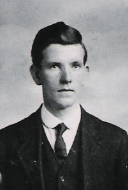James Marley
| James Marley | |
|---|---|
|
James Marley, circa 1917 | |
| Member of Parliament for St Pancras (North) | |
| Personal details | |
| Born |
6 May 1893 Shotts, Lanarkshire |
| Died |
11 April 1954 Bromley, Kent |
| Nationality | British |
| Political party | Labour |
James Marley (6 May 1893 – 11 April 1954) was a schoolmaster and a Labour politician who sat in the House of Commons between December 1923 and October 1924 and, again, between May 1929 and October 1931. He was the 7th and 9th M.P. for St Pancras (North). The constituency was created in 1885 and abolished in 1983, when it became part of the new constituency of Holborn and St Pancras.
In the General Election of 6 December 1923, James Marley won his first seat in Parliament with a 2872 gain for Labour[1] over the previous Conservative incumbent, John William Lorden, in what was to become the first Labour Government (1924). It was a short-lived victory for him and, in a hung parliament, his seat was taken, on 29 October 1924 in the General Election by his Conservative successor, Ian Fraser (later Baron Fraser of Lonsdale). He remained in politics, however, and was re-elected to the St Pancras (North) seat once again in May 1929, holding the seat until 27 October 1931, when he fell prey to again to a hung parliament, the seat being retrieved by Ian Fraser for the Conservatives.
Biography
James was the son of William Marley (1869–1948) and Margaret Shannon (1874–1922). He was born in Shotts, Lanarkshire, Scotland and moved to London in 1917 to take up a teaching post at St Dominic's Boys' School in Hampstead (1917–19). During this time, he met and married his wife Alice Louise Pilgrim (1880–1945) the daughter of William Pilgrim, (1845–1922) an Inspector for the Society for the Prevention of Cruelty to Animals and a former London Metropolitan policeman. The marriage between James Marley and Alice Louise Pilgrim took place in Shotts, Lanarkshire, Scotland on 16 May 1920. Marley died in Bromley, Kent in April 1954, aged 60.
Marley worked at the following schools[2] in Scotland and London:
- 1915–1916 St Francis Xavier's School, Carfin, Motherwell, Scotland
- 1917–1919 St Dominic's Boys' School, Hampstead, London
- 1919 :::::: St Peter's Italian R.C. School, Herbal Hill, Holborn, London
- 1919–1923 St Dominic's Boys' School, Hampstead, London
- 1925–1929 St Francis Boys' School, North Kensington, London
Education
- St Aloysius College, Glasgow
- St Mungo's Academy, Glasgow
- St Mary's Training College, Hammersmith (now in Twickenham)
- London School of Economics, University of London[3]
Gandhi's visit to the UK
In September 1931, Marley was amongst those who welcomed Mohandas Karamchand Gandhi at Folkestone when he visited the United Kingdom for the second Round Table conference.[4][5][6]
Robeson Affair
In April 1929, the African-American concert singer Paul Robeson was refused entry to a London hotel. He wrote to Marley complaining about his treatment and the letter was made public, causing uproar in the UK and the US. The matter led to a debate in Parliament later that year (October 1929) into racial discrimination by English hotels.[7][8][9]
References
- ↑ Hayes Peoples History
- ↑ FindmyPast – Teacher Certification
- ↑ Black, A & C, "Who was Who" 1920–2008, Online Edition, OUP, December 2007
- ↑ Gandhi at Folkestone on YouTube
- ↑ "The Round Table: Arrival of the Delegates – Mr Gandhi in London", 14 September 1931
- ↑ Pennybacker, S. D., From Scottsboro to Munich, Princeton University Press, p 175
- ↑ Robeson, P. The undiscovered Paul Robeson: an artist's journey, 1898–1939 (p 157), John Wiley and Sons, 2001
- ↑ Freedomways, "Paul Robeson: The Great Forerunner", International Publishers Co, 1998
- ↑ "Colour Bar in London", Manchester Guardian, 23 October 1929
| Parliament of the United Kingdom | ||
|---|---|---|
| Preceded by John Lorden |
Member of Parliament for St Pancras North 1923–1924 |
Succeeded by Ian Fraser |
| Preceded by Ian Fraser |
Member of Parliament for St Pancras North 1929–1931 |
Succeeded by Ian Fraser |
